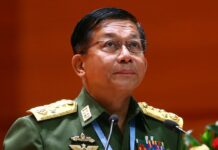Today, I miss the panel that I had set my heart on, the one on drugs. Though I have researched and written much about the subject, it (especially opium cultivation) has always fascinated me as it is directly linked to the lives of the people in the rural areas. Unfortunately, my other commitments have kept me away from it.
But, to my delight, I later received a copy of the paper read out by a young Ph.D. candidate John Buchanan. Here are two of the excepts from his presentation:
- A factor that helps account for the growth of (opium) production is predatory militarization (which) included forced portering, seizures of rice and livestock and the Tatmadaw’s targeting of the civilian population as part of its early counter insurgency efforts. These practices impinged on the ability of farmers to produce and secure resources—whether starches such as rice or protein from livestock—essential for their food security and survival.
- The recent rise in illicit opium production in Burma and Afghanistan indicates the need for further examination of current strategies. (This is in spite of the fact that) in Afghanistan, the US has spent $ 7.6 billion (2002-2013) on counter-narcotic efforts.
The panel I’m in is on the peace process, divided into two sessions: Update and The Way Forward.
One good thing you can say about it that it is being held a day before the senior leaders are to examine and decide on the draft Nationwide Ceasefire Agreement (NCA) that had been negotiated with the government yesterday. The audience, more than 100 of them, are eager to know what it should be: To sign or not to sign.
But the unfortunate thing about it is that the negotiators are returning from Rangoon only today. As a result, there’s no one to present the audience with a different view.
To be sure, almost all the panelists, which include representatives from Common Space Initiative, (CSI), Euro-Burma Office (EBO), and Myanmar Peace Center (MPC) as well as a few other academics are for signing it.
They have their powerful arguments on their side too:
- If we are to restart the process after the elections, we’ll have to wait another year.
- The risk of not signing is that the next government may not have the same interests, at least not on the same leverage.
- If the NCA draft is signed, the armed movements will:
- Be able to retain their arms
- No longer be illegal organizations
- Be able to negotiate with the government collectively
- Be able to jointly with the government and political parties manage the political dialogue
- Be able to continue to carry out interim measures set forth in the draft while the dialogue is taking place
- Be able to jointly monitor the ceasefire and prevent a return to conflict through a jointly adopted Code of Conduct
- Be able to change the 2008 Constitution
Harn Yawnghwe, executive director of the EBO, nevertheless draws attention to the concern universal among the armed movements that groups that are not recognized by the government and therefore not eligible to sign it may be militarily wiped out one by one. “There must be adequate guarantees that these groups are not attacked, receive humanitarian assistance and are able to participate in the political negotiations,” he says.
The reaction, according to an academic attendant, are mixed. “There are those who have become more interested in the peace process, while others seem unable to digest the message from the panelists,” he tells me.
“Some of their concerns are legitimate. For example, the massive land grabs that are taking place. They fear it will get worse after the NCA is signed.”
The other is the ever-hard-to-get-rid-of distrust placed against the government-cum-army, especially because of the ongoing offensives in Kachin and Shan states. “How can we trust them to honor it?” is the common question that is being asked.
A friend who is an academic and a Christian scoffs at such questions. “Trust should not be in the way of making peace between two people,” he told me.
“For example, I don’t trust my wife though we’ve been married for more than ten years after making mutual vows in front of God that we would love, cherish and be faithful to each other until death do us part. On the contrary, I think I’ll trust her only when death do us part.”
Which reminds me of what Lao Zi, who was a Shan (or Tai) sage according to a German scholar, said:
Trustworthy people, I trust
Untrustworthy people, I trust (Chapter 49)
However, the armed resistance leaders seem to think otherwise.
“We are now at the stage when we can say, ‘Of the whole elephant, only the tail remains stuck,’” Gen Mutu Saypoe, President of the Karen National Union (KNU), says. “I hope the NCA doesn’t turn out to be a short-tailed elephant.”
For myself, I don’t know whose prayers are going to come true. But we’ll know the answer in the first week of August, when the two sides are scheduled to meet again.
















Leave a Comments